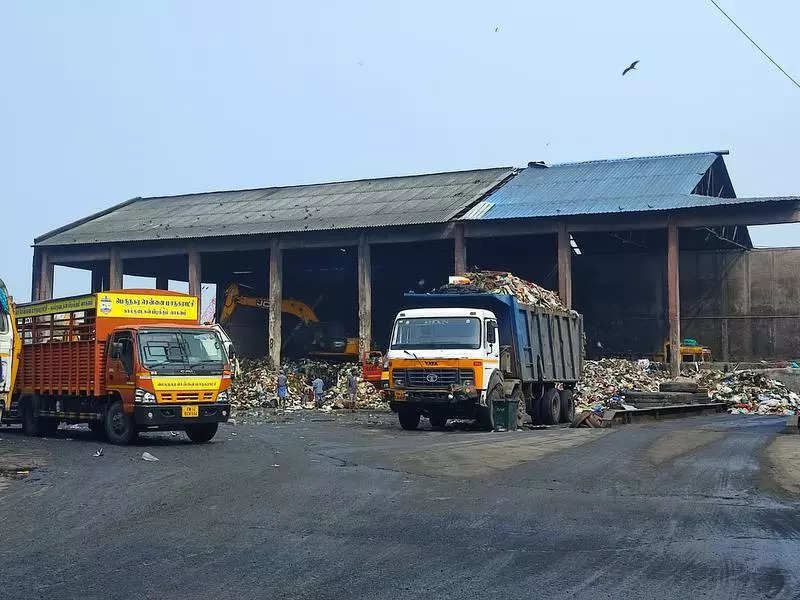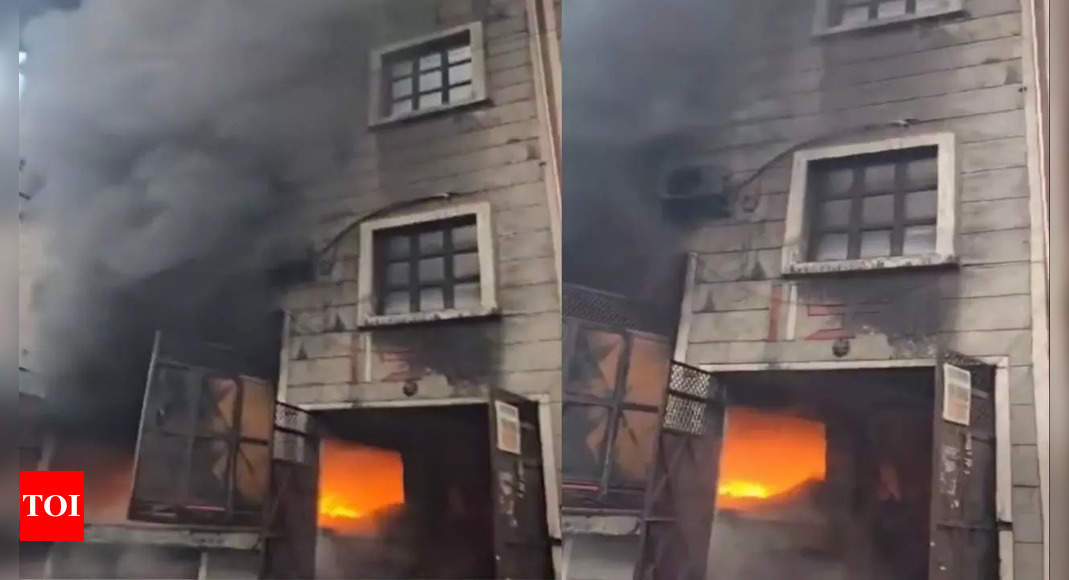Chennai: Imagine living in a place where opening a window lets in the stench of garbage, not fresh air. This is the reality for more than 1,500 families in Pulianthope, including 600 households at KP Park resettlement colony who have permanently shut their windows to keep out the unbearable smell from Greater Chennai Corporation (GCC) garbage transfer station across the road.
Situated in a residential neighbourhood off Basin Bridge Road, the transfer station receives 1,500 tonnes of unsegregated waste daily from Anna Nagar, Ambattur, and Thiru Vi Ka Nagar. The mix of biodegradable and non-biodegradable waste, including food and garden refuse, is stored in the open for hours, forming mini-landfills before being transported to the Kodungaiyur dump yard 5km away in open lorries.
Children cannot play in the GCC park near the station, and youngsters avoid the multi-purpose sports ground nearby. “Our kitchen faces the garbage station. It operates all day, and when earthmovers are used to move the waste, the smell is overwhelming. Cooking has become a nightmare,” said K Suneesha of Basin Bridge Road, whose four-year-old son frequently suffers from cough.
Experts suggest that the waste be segregated and processed within individual wards through bio-CNG and micro-composting units, which would reduce the burden on large transfer stations and improve the quality of life for local residents.
The situation extends beyond Pulianthope. Basin Bridge Road is a vital link between Chennai Central and areas such as Vyasarpadi, MKB Nagar, Mint and Old Washermenpet, with more that one lakh vehicles passing daily. Motorists and pedestrians regularly cover their faces while passing the transfer station.
“Facilities like this should not exist in densely populated areas. Food waste from hotels can release toxic odours, affecting asthma patients and increasing the risk of diseases such as diarrhoea, vomiting, and jaundice,” said Dr K Kolandasamy, former Director of Public Health. He suggested decentralizing the transfer station into smaller facilities across different zones to reduce the load on Pulianthope.
Dr G Shanthakumari, standing committee chairman (health), said discussions are planned in an upcoming meeting to establish more bio-CNG plants and decentralize waste management. “A solution to relocate the transfer station will be implemented soon,” she said.
Situated in a residential neighbourhood off Basin Bridge Road, the transfer station receives 1,500 tonnes of unsegregated waste daily from Anna Nagar, Ambattur, and Thiru Vi Ka Nagar. The mix of biodegradable and non-biodegradable waste, including food and garden refuse, is stored in the open for hours, forming mini-landfills before being transported to the Kodungaiyur dump yard 5km away in open lorries.
Children cannot play in the GCC park near the station, and youngsters avoid the multi-purpose sports ground nearby. “Our kitchen faces the garbage station. It operates all day, and when earthmovers are used to move the waste, the smell is overwhelming. Cooking has become a nightmare,” said K Suneesha of Basin Bridge Road, whose four-year-old son frequently suffers from cough.
Experts suggest that the waste be segregated and processed within individual wards through bio-CNG and micro-composting units, which would reduce the burden on large transfer stations and improve the quality of life for local residents.
The situation extends beyond Pulianthope. Basin Bridge Road is a vital link between Chennai Central and areas such as Vyasarpadi, MKB Nagar, Mint and Old Washermenpet, with more that one lakh vehicles passing daily. Motorists and pedestrians regularly cover their faces while passing the transfer station.
“Facilities like this should not exist in densely populated areas. Food waste from hotels can release toxic odours, affecting asthma patients and increasing the risk of diseases such as diarrhoea, vomiting, and jaundice,” said Dr K Kolandasamy, former Director of Public Health. He suggested decentralizing the transfer station into smaller facilities across different zones to reduce the load on Pulianthope.
Dr G Shanthakumari, standing committee chairman (health), said discussions are planned in an upcoming meeting to establish more bio-CNG plants and decentralize waste management. “A solution to relocate the transfer station will be implemented soon,” she said.




